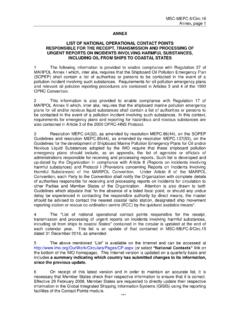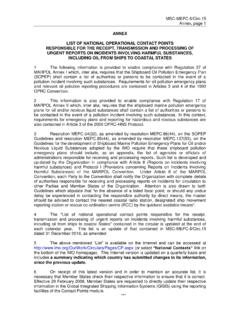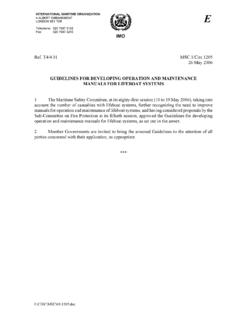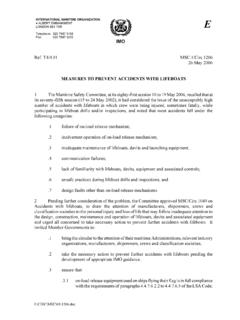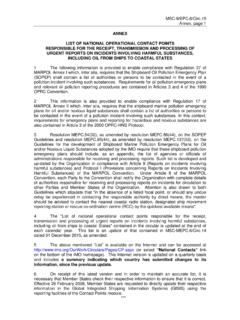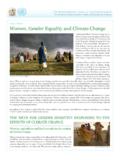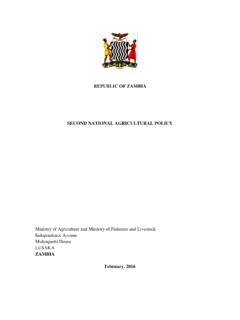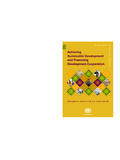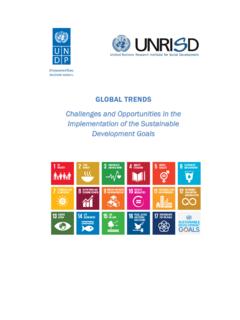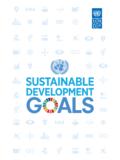Transcription of IMO and Sustainable Development
1 IMO and Sustainable DevelopmentIn September 2015, the UN s 193 Member States unanimously adopted the 2030 Agenda for Sustainable Development , including the 17 Sustainable Development Goals (SDGs) and 169 related targets. Hailed as a historic agreement forging a pathway to sustainability, the 2030 Agenda has been called a plan of action for people, planet and prosperity . The SDGs apply to all countries and, by adopting the Agenda, Member States have committed, during the period up to 2030, to mobilizing efforts to end all forms of poverty, fighting inequalities and tackling climate change, while ensuring that no one is left behind.
2 The Agenda emphasizes the need to consider simultaneously the three dimensions of Sustainable Development : social, economic and environmental. IMO recognizes that, for its Member States and the UN system to implement the 2030 Agenda, this new framework will have to be translated into national policies and strategies taking into account cross-INTRODUCTIONHOW INTERNATIONAL SHIPPING AND THE MARITIME COMMUNITY CONTRIBUTE TO Sustainable Development cutting issues. As the 2030 Agenda will be implemented principally at the country level, IMO will develop and formulate innovative and targeted maritime policies to respond to the needs of countries at the national, regional and global UN system, of which IMO is a part, is fully committed to supporting the successful implementation of the 2030 Agenda, based on the combined expertise and strengths of each entity within the system, and to ensuring universal coherence.
3 Through increased collaboration, IMO will work to eliminate duplication and fragmentation within the a specialized agency of the United Nations responsible for global standards for safe, secure, clean and efficient maritime transport, IMO has an important role to play in helping to achieve the 2030 Agenda for Sustainable Development , including the SDGs. International shipping greatly benefits the world by moving food , commodities, raw materials, energy and consumer goods reliably and effectively around the globe at low cost. Working together with ports and other stakeholders in the maritime industry, international shipping is indispensable to the functioning of global trade.
4 By connecting producers, manufacturers and consumers, it provides a way for IMO Member States to enhance trade with one more than 60 years of expertise and experience, IMO is already contributing to Sustainable Development . Shipping is an essential component of Sustainable economic growth, as it is the most environmentally sound mode of transport, having the lowest carbon footprint per unit of cargo transported. Through IMO, Member States, civil society and the maritime industry are already working together to strengthen ongoing efforts towards Sustainable Development . Sustainable maritime transportation is a cross-cutting issue and, as such, is an important enabler for most of the SDGs.
5 The connection between IMO s work and the SDGs is outlined in this each SDG addresses a different aspect of sustainability, the SDGs are interconnected. Therefore, some IMO activities may contribute to more than one international shipping takes place on the world s oceans, and IMO is responsible for measures to improve the safety and security of international shipping and to prevent pollution from ships, IMO s work is integral to SDG 14. IMO s objectives can be summarized as follows: safe, secure and efficient shipping on clean work of IMO therefore relates to most, if not all, of the SDG 14 targets, particularly as regards its environmental conventions.
6 Implementing and enforcing the main conventions and regulations adopted by IMO Member States actively addresses marine pollution, mainly that from sea-based sources but also, at least indirectly, from land-based sources, for example through the London Convention and Protocal (LC/LP) on dumping wastes and other matter at also supports the targets for managing and protecting marine CONSERVE AND SUSTAINABLY USE THE OCEANS, SEAS AND MARINE RESOURCES FOR Sustainable DEVELOPMENTIMO AND THE UN SDGSand coastal ecosystems, not least through the establishment of Special Areas under MARPOL and Particularly Sensitive Sea Areas (PSSAs).
7 IMO s work to address climate change is also significant. Air pollution and greenhouse gas emissions from ships are regulated under MARPOL Annex VI. Regarding ocean acidification, IMO has established a regulatory framework (under the LC/LP) that will contribute to climate-change mitigation by regulating for carbon capture and sequestration in subsea geological formations and for marine geoengineering. The fundamental purpose of IMO, as described in the IMO Convention, is rooted in the conservation and Sustainable use of oceans and their resources. This is further reflected in the Organization s Development , adoption and implementation of international law through the IMO treaty regime.
8 This foundation is again reflected in the linkages between the IMO treaty regime and the United Nations Convention on the Law of the Sea (UNCLOS). IMO is, inter alia, the UNCLOS competent organization for navigational safety (Parts II-IV); the safety of life at sea, including the design, construction, equipment and manning of ships; for safety and environmental protection (Articles 21, 94, 211); the protection of the marine environment generally, (Part XII); maritime security (Article 21); liability and compensation for maritime casualties (Article 235); and response systems for search IMO actively addresses marine pollutionand rescue and environmental incidents (Articles 43, 98, 221).
9 Acting as the competent organization through such a broad ranges of activities gives IMO a considerable role in the attainment of SDG 14. IMO is also working with the food and Agriculture Organization of the United Nations (FAO) to address illegal, unreported and unregulated (IUU) fishing. END POVERTY IN ALL ITS FORMS EVERYWHERE END HUNGER, ACHIEVE food security AND IMPROVED NUTRITION AND PROMOTE Sustainable AGRICULTURE PROMOTE PEACEFUL AND INCLUSIVE SOCIETIES FOR Sustainable Development , PROVIDE ACCESS TO JUSTICE FOR ALL AND BUILD EFFECTIVE, ACCOUNTABLE AND INCLUSIVE INSTITUTIONS AT ALL LEVELS As the most cost-effective and fuel-efficient way to transport goods, maritime transport is the backbone of world trade and globalization.
10 All year round, ships carry cargoes to all corners of the globe. World trade and maritime transport are fundamental to sustaining economic growth and spreading prosperity throughout the world. Shipping will continue to grow with the anticipated increase in world trade. Improved access to basic materials, goods and products is expected to lift millions of people out of poverty and, thereby, contribute to achieving SDGs 1 and , through its regulatory framework, facilitates a global maritime transportation system that connects markets and moves 80% of global trade. But, in order for that system to flow efficiently, without unnecessary delay, it must be underpinned by a global system of law and regulation that is uniform in its Development and implementation.
